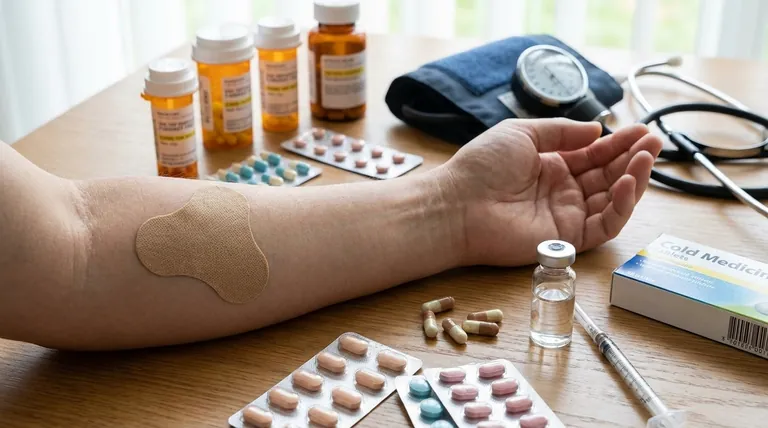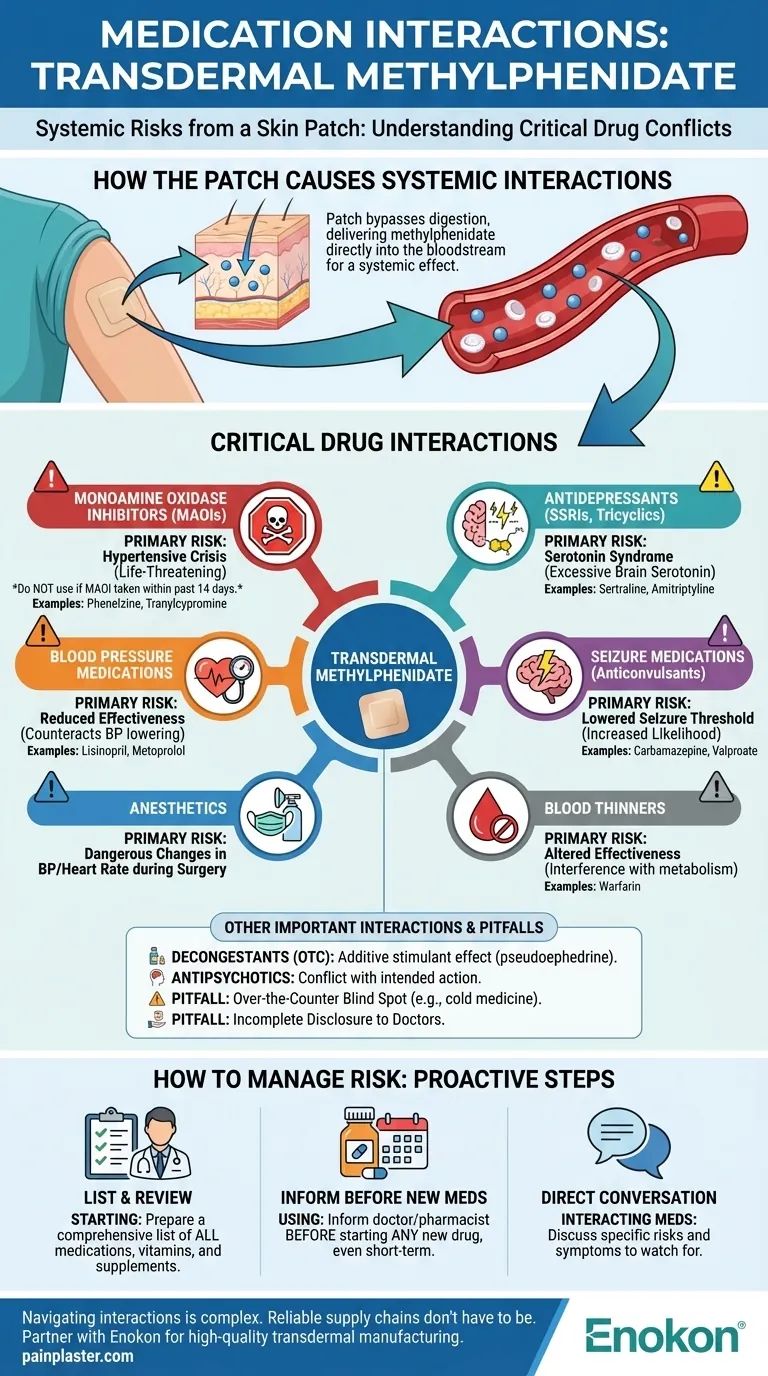Yes, transdermal methylphenidate interacts with several classes of medication. The most critical interactions involve Monoamine Oxidase Inhibitors (MAOIs), which can cause a life-threatening hypertensive crisis. Other significant interactions occur with blood pressure medications, certain antidepressants (SSRIs and tricyclics), seizure medications, anesthetics, and blood thinners.
Because the methylphenidate patch delivers medication directly into your bloodstream, it has a systemic effect and can cause widespread drug interactions. The central challenge is not the patch itself, but how the stimulant properties of methylphenidate conflict with other drugs that regulate blood pressure, brain chemistry, and blood clotting.

How a Skin Patch Causes Systemic Drug Interactions
Many assume that a medication applied to the skin only works locally. This is a critical misunderstanding when it comes to transdermal patches.
The Patch is a Gateway to the Bloodstream
A transdermal patch like Daytrana is specifically designed to bypass the digestive system and deliver methylphenidate directly into your circulation.
Once in the blood, the drug travels throughout your entire body. This means it can interact with any other medication that is also circulating in your system, regardless of whether that other drug was taken as a pill, injection, or another patch.
Critical Drug Interactions with Transdermal Methylphenidate
It is essential to discuss all medications with your doctor, but the following classes require special attention due to the severity of potential interactions.
Monoamine Oxidase Inhibitors (MAOIs)
This is the most dangerous interaction. Combining methylphenidate with an MAOI antidepressant can lead to a hypertensive crisis—a rapid, severe, and potentially fatal increase in blood pressure.
You must not use the methylphenidate patch if you have taken an MAOI within the past 14 days.
Antidepressants (SSRIs and Tricyclics)
When combined with antidepressants like SSRIs or tricyclics, methylphenidate can increase the risk of serotonin syndrome. This is a serious condition caused by excessive serotonin levels in the brain.
Blood Pressure Medications
Methylphenidate is a stimulant and can raise blood pressure and heart rate. This action can directly counteract the effects of medications prescribed to lower your blood pressure, making them less effective.
Seizure Medications (Anticonvulsants)
Stimulants like methylphenidate may lower the seizure threshold. This can potentially reduce the effectiveness of anticonvulsant medications, making seizures more likely.
Anesthetics
If you are scheduled for surgery, you must inform your surgeon and anesthesiologist that you use the methylphenidate patch. The combination can lead to sudden, dangerous changes in blood pressure and heart rate during the procedure.
Other Important Interactions
Several other drug types can also pose risks:
- Blood Thinners (e.g., Warfarin): Methylphenidate can interfere with how these drugs are metabolized, potentially altering their effectiveness.
- Antipsychotics (e.g., Risperidone): The stimulating effects of methylphenidate may conflict with the intended action of some antipsychotic drugs.
- Decongestants: Many over-the-counter cold and allergy medicines contain their own stimulants (like pseudoephedrine), which can have an additive effect when combined with methylphenidate, further increasing blood pressure and heart rate.
Common Pitfalls to Avoid
Understanding potential mistakes is key to using this medication safely.
The "Over-the-Counter" Blind Spot
Patients often forget to mention non-prescription drugs, vitamins, or herbal supplements. Decongestants found in cold medicine are a classic example of a seemingly harmless drug that can cause a significant interaction.
Assuming Your Pharmacist Knows Everything
Your pharmacist can only check for interactions among the prescriptions they fill for you. If you have prescriptions at different pharmacies or are taking supplements, they won't have the complete picture. Only your prescribing doctor can manage this effectively.
The Danger of Incomplete Disclosure
The only way for your healthcare provider to ensure your safety is for them to know every single substance you take. There is no substitute for providing a complete and updated list at every appointment.
How to Apply This to Your Treatment
Your primary goal is to facilitate clear communication with your healthcare team to manage risk proactively.
- If you are starting the methylphenidate patch: Prepare a comprehensive list of all your current medications, including over-the-counter drugs, vitamins, and supplements, to review with your doctor.
- If you are already using the patch: You must inform your doctor and pharmacist before starting any new medication, even for a short-term issue like a cold or upcoming surgery.
- If you take any interacting medication: Have a direct conversation with your provider about the specific risks and what symptoms you should watch for.
Ultimately, your safety depends on a partnership between your own vigilance and your doctor's expertise.
Summary Table:
| Medication Class | Primary Risk | Key Examples |
|---|---|---|
| Monoamine Oxidase Inhibitors (MAOIs) | Hypertensive Crisis (Life-Threatening) | Phenelzine, Tranylcypromine |
| Antidepressants (SSRIs, Tricyclics) | Serotonin Syndrome | Sertraline, Amitriptyline |
| Blood Pressure Medications | Reduced Effectiveness | Lisinopril, Metoprolol |
| Seizure Medications | Lowered Seizure Threshold | Carbamazepine, Valproate |
| Anesthetics | Dangerous BP/Heart Rate Changes | Various anesthetics used in surgery |
| Blood Thinners | Altered Effectiveness | Warfarin |
Navigating drug interactions is complex, but your supply chain for transdermal products doesn't have to be.
At Enokon, we are a bulk manufacturer of reliable transdermal patches and pain plasters for healthcare and pharmaceutical distributors and brands. Our technical expertise ensures consistent, high-quality delivery systems, minimizing risks associated with product variability.
Partner with us to benefit from:
- Expert R&D and Custom Development: Tailor patches to your specific active ingredients and release profiles.
- Rigorous Quality Control: Ensure every patch meets the highest safety and efficacy standards.
- Scalable, Reliable Manufacturing: Secure a dependable supply for your critical healthcare products.
Let's discuss how our expertise can support your next transdermal project. Contact our team today for a consultation.
Visual Guide

Related Products
- Far Infrared Deep Heat Relief Patches Medicated Pain Relief Patches
- Far Infrared Heat Pain Relief Patches Transdermal Patches
- Heating Pain Relief Patches for Menstrual Cramps
- Menthol Gel Pain Relief Patch
- Icy Hot Menthol Medicine Pain Relief Patch
People Also Ask
- How do pain relief patches work? A Guide to Targeted, Long-Lasting Pain Relief
- How do Deep Heat Pain Relief Patches provide pain relief? Discover the Drug-Free Mechanism
- How quickly does the Deep Heat Pain Relief Back Patch activate and how long does it provide warmth? Get 16-Hour Relief
- How do pain relief patches provide targeted relief? Discover the Science Behind Effective Pain Management
- How effective are pain relief patches for muscle pain? Target Localized Pain with Transdermal Delivery













